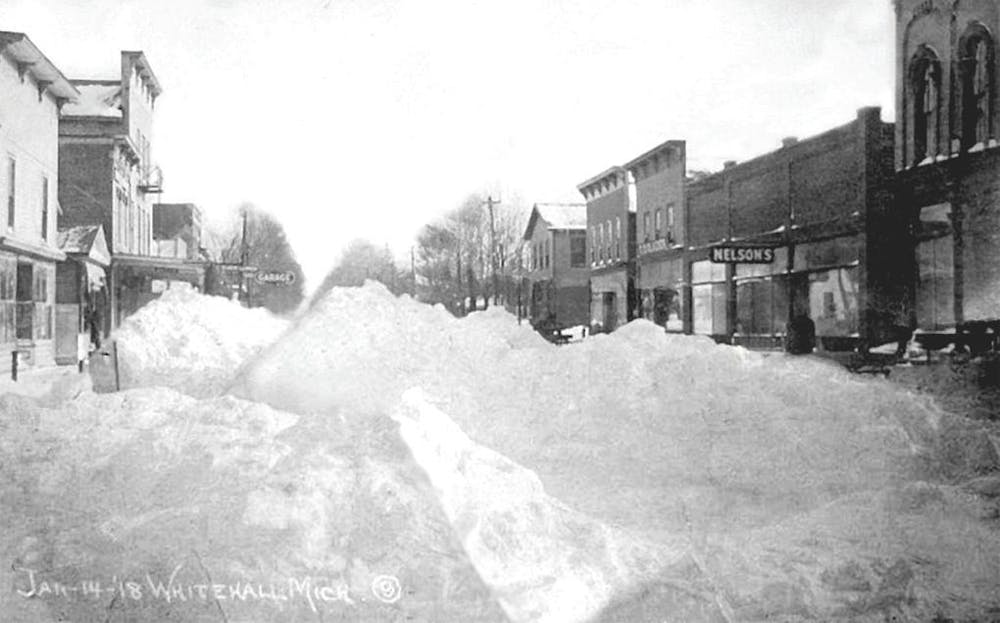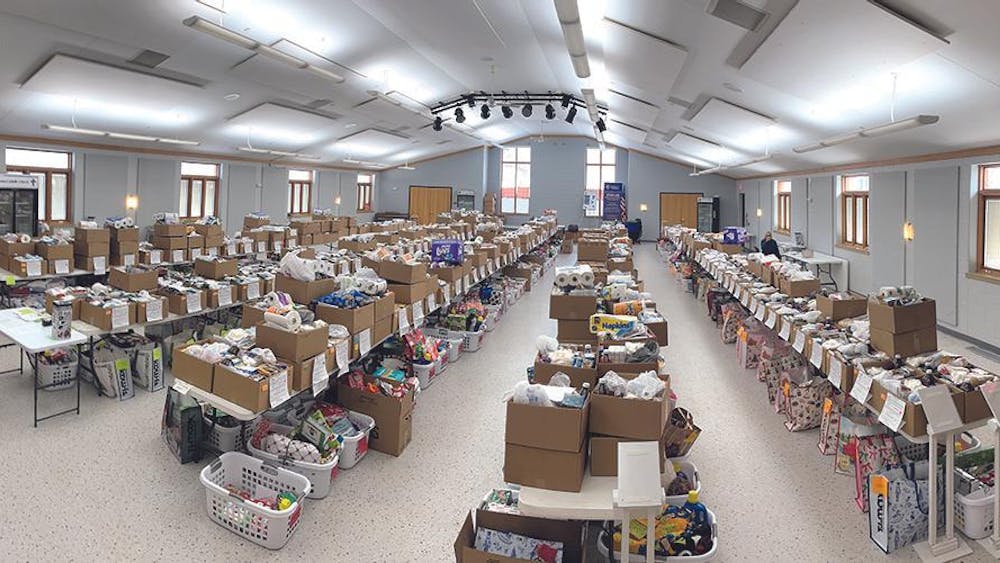The worst snowstorm in many years struck the area Sunday morning, Jan. 6, 1918, and kept up for nearly 24 hours. The snow was so blinding it was not safe for pedestrians to leave their homes. Snow on the level was over two feet deep and drifts were from 10 to 14 feet.
On Monday morning, Jan. 7, the Eagle-Ottawa Leather Co. was called upon to try to break a road through Whitehall and they sent their mammoth snowplow and two teams, but it was a hard pull all the way as the snow was quite heavy.
Colby Street was a sight to be seen. A bank of snow about 11 feet high extended from Gee & Carr’s to Hotel Mears. The Pere Marquette train did not make its run down from the north until Tuesday at noon. No train or mail was received from the south until Tuesday evening.
The snowstorm of the 6th and 7th had hardly passed over when another blizzard came. It started Friday night, Jan. 11 and continued until Monday, Jan. 14. The snow was at least four feet on the level.
Montague experienced two disastrous fires during Saturday and Sunday’s blizzard which drove three families out of their homes, one barely escaping with their lives.
The first fire occurred Saturday morning about 10 a.m. when the Adrian Koert house on North hill caught fire, presumably from a defective chimney flue. Mrs. Koert detected smoke, and upon going to the kitchen, discovered it was on fire. Despite the raging storm and deep snow, the fire department was promptly on the scene and did a very credible job in extinguishing the flames. The chemical truck was also put into play and proved worthy by blanketing the fire before it gained headway in the upright part of the house. The rear of the house was practically ruined.
About 2 a.m. Sunday morning the alarm of fire was again sounded while the blizzard was still raging. This time Harry Kropf and his family barely escaped with their lives as the flames were spreading throughout the old Saunders house. Mr. Kropf ran downtown after being badly burned to ring the fire bell. Mrs. Kropf ran in her stocking feet through the deep snow to her neighbor’s house. Will Lipka and Rev. Chamberlain rescued the four small children and an aged grandmother and took them to the home next door and when it too caught fire, they were taken to the M. E. parsonage.
The fire department was handicapped by the deep snow, shortage of men and the lack of a team to pull the hose cart, so several lengths of hose were unreeled, carried up the hill and connected to the nearest hydrant. A short time later a team was secured, the hose cart pulled up, and the second line of hose laid to the fire. For a considerable time, a bucket brigade prevented the fire from spreading to Waitman house, which was close by, but finally they had to abandon it. The firemen fought to save this structure and prevent the fire from moving on to a third house owned by M. W. Ripley. Mr. & Mrs. Will Lipka occupied the wing part of the house and saved most all of their household effects, but Mrs. Waitman’s furniture in the upright part of the house was badly damaged.
Both the Waitman and Saunders houses were fully covered by insurance. Mr. & Mrs. Kropf, however, lost practically everything in their house without any insurance. It was determined the fire originated from the explosion of an oil stove which Mr. Kropf had lit upon coming home late. In his effort to throw the stove outdoors, he was severely burned on his face, hands and legs.
Once again, the train service was disrupted in the area. There were no church or Sunday school services.
Rural route carriers were unable to make their trips Monday and Tuesday. On Wednesday, they made an attempt again but could not complete their entire routes.
The farmers in the rural area were just getting the roads broken through when the second record-breaking storm set in, and it would take several more days before the roads were good for travel again.
The fuel situation in Montague got serious as several families were either out of fuel or had a very scant supply. All the local coal dealers had exhausted their supply and were waiting for the trains to get through with more.
A carload of coal originally intended for the Iron Works was confiscated and was being distributed to the needy. With that source nearly depleted, if another car of coal wasn’t received in the near future, there would be actual suffering among the citizens in want of fuel. The roads were so bad, and the snow so deep, it was very difficult for teams taking wood to those in need to get through.
Although the Iron Works was disappointed in not getting their coal supply, they resorted to burning wood to keep the shop open. A group of men were working north of town chopping up stump fences and fallen timber which had been purchased by the company.
Bone-chilling temperatures were also reported in the area during this time. On Jan. 31, the temperature dropped to 16 degrees below zero. On Feb. 1, the United States Coast Guard in Muskegon recorded a temperature of 24 degrees below zero. Temperatures finally warmed up in February and eventually things returned to normal again.














